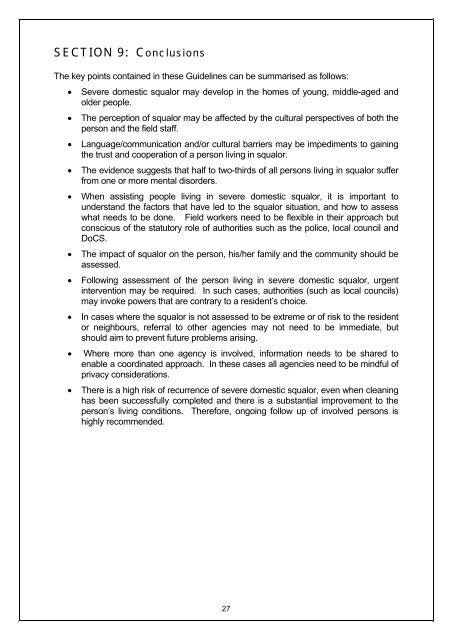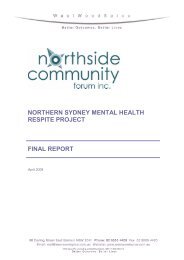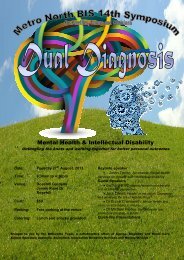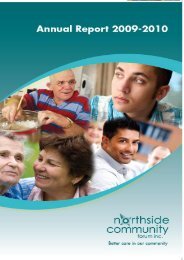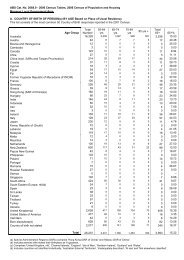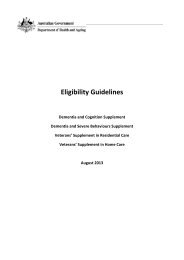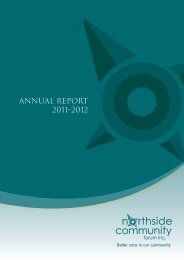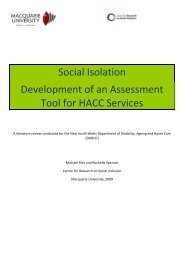Guidelines for field staff to assist people living in ... - Housing NSW
Guidelines for field staff to assist people living in ... - Housing NSW
Guidelines for field staff to assist people living in ... - Housing NSW
You also want an ePaper? Increase the reach of your titles
YUMPU automatically turns print PDFs into web optimized ePapers that Google loves.
SECTION 9: ConclusionsThe key po<strong>in</strong>ts conta<strong>in</strong>ed <strong>in</strong> these <strong>Guidel<strong>in</strong>es</strong> can be summarised as follows:• Severe domestic squalor may develop <strong>in</strong> the homes of young, middle-aged andolder <strong>people</strong>.• The perception of squalor may be affected by the cultural perspectives of both theperson and the <strong>field</strong> <strong>staff</strong>.• Language/communication and/or cultural barriers may be impediments <strong>to</strong> ga<strong>in</strong><strong>in</strong>gthe trust and cooperation of a person <strong>liv<strong>in</strong>g</strong> <strong>in</strong> squalor.• The evidence suggests that half <strong>to</strong> two-thirds of all persons <strong>liv<strong>in</strong>g</strong> <strong>in</strong> squalor sufferfrom one or more mental disorders.• When <strong>assist</strong><strong>in</strong>g <strong>people</strong> <strong>liv<strong>in</strong>g</strong> <strong>in</strong> severe domestic squalor, it is important <strong>to</strong>understand the fac<strong>to</strong>rs that have led <strong>to</strong> the squalor situation, and how <strong>to</strong> assesswhat needs <strong>to</strong> be done. Field workers need <strong>to</strong> be flexible <strong>in</strong> their approach butconscious of the statu<strong>to</strong>ry role of authorities such as the police, local council andDoCS.• The impact of squalor on the person, his/her family and the community should beassessed.• Follow<strong>in</strong>g assessment of the person <strong>liv<strong>in</strong>g</strong> <strong>in</strong> severe domestic squalor, urgent<strong>in</strong>tervention may be required. In such cases, authorities (such as local councils)may <strong>in</strong>voke powers that are contrary <strong>to</strong> a resident’s choice.• In cases where the squalor is not assessed <strong>to</strong> be extreme or of risk <strong>to</strong> the residen<strong>to</strong>r neighbours, referral <strong>to</strong> other agencies may not need <strong>to</strong> be immediate, butshould aim <strong>to</strong> prevent future problems aris<strong>in</strong>g.• Where more than one agency is <strong>in</strong>volved, <strong>in</strong><strong>for</strong>mation needs <strong>to</strong> be shared <strong>to</strong>enable a coord<strong>in</strong>ated approach. In these cases all agencies need <strong>to</strong> be m<strong>in</strong>dful ofprivacy considerations.• There is a high risk of recurrence of severe domestic squalor, even when clean<strong>in</strong>ghas been successfully completed and there is a substantial improvement <strong>to</strong> theperson’s <strong>liv<strong>in</strong>g</strong> conditions. There<strong>for</strong>e, ongo<strong>in</strong>g follow up of <strong>in</strong>volved persons ishighly recommended.27


